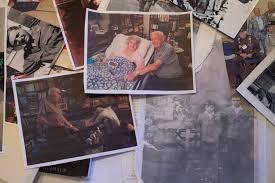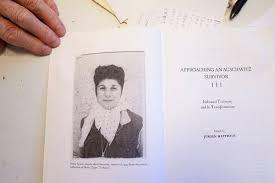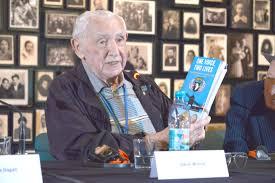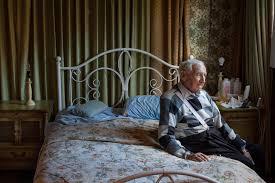Results: A Reunion 72 Years In The Making
Published on 12/10/2019
QUESTIONS
GO to COMMENTS
Comments
1.
1.
Get out your tissues, because this will guarantee to bring you to tears. They were both Jewish inmates in Auschwitz, both privileged prisoners. For whatever reason, they were both handpicked by the Nazi officers to "work" rather than be exterminated. David Wisnia, then 17, initially forced to collect the bodies of prisoners who committed suicide, had been chosen to entertain the Nazi when they discovered he was a talented singer. Helen Spitzer, then 25, held the more high-powered position: She was the camp's graphic designer. They met, and became lovers. Knowing they were putting their lives in danger, they continued, each being the other's escape from the reality of their situation. Around them, death was everywhere. Still, the lovers planned a life together, a future outside of Auschwitz. They knew if they survived, they would be separated, but they had a plan, after the fighting was done, to reunite. For the time being, they were glad just to escape death themselves. Did you know anyone who was in any of the death camps during World War II?

Yes
11%
255 votes
No
73%
1715 votes
I was
1%
33 votes
Not personally, but I have heard stories of some that were
15%
360 votes
2.
2.
As one of the first women to be taken to Auschwitz, Helen spent the first few months malnourished and perpetually ill with typhus, malaria and diarrhea, but somehow was able to escape death. Through her ability to speak German, her graphic design skills and sheer luck, she secured an office job. Her initial assignments included mixing red powder paint with varnish to draw a vertical stripe on female prisoners' uniforms. Eventually, she started registering all female arrivals in camp. Yet, she was never a Nazi collaborator or a kapo, a Jew assigned to oversee other prisoners. Instead, she used her position to help inmates and allies. She used her design skills to manipulate paperwork and reassign prisoners to different job assignments and barracks, essentially saving them from death. Do you admire the fact that she risked her life to help other prisoners survive?

Yes
78%
1854 votes
No
10%
231 votes
Undecided
12%
278 votes
3.
3.
After liberation, the two were separated, and despite their plans to meet again, it was not to be. That is, until 72 years later. David, who went on to become a Cantor in the U.S., didn't talk much about his time in the camps. He never talked about Helen, or his experiences in his youth. As the Holocaust fades from public memory and anti-Semitism is once again on the rise, he finds himself speaking about his past with more urgency. This is quite a turn for a man who spent most of his adult life trying not to look back. His oldest son learned only as a teenager that his father wasn't born in America. (His father worked hard to lose his European accent.) His children and grandchildren coaxed him to talk about his past. Gradually, he opened up. Once he started sharing his story, others convinced him to speak publicly. In 2015, he published a memoir, "One Voice, Two Lives: From Auschwitz Prisoner to 101st Airborne Trooper." That was when his family first learned about his Auschwitz girlfriend. He referred to her under a pseudonym, Rose. Have you ever learned about a surprising part of a family member's life that you did not even know about?

Yes
29%
692 votes
No
56%
1335 votes
Undecided
14%
336 votes
4.
4.
Helen never left Europe, but because of the book, they found each other again. The reunion, which was 72 years in the making, lasted about two hours. He finally had to ask: Did she have something to do with the fact that he'd managed to survive in Auschwitz all that time? She held up her hand to display five fingers. "I saved you five times from bad shipment," she said. "I knew she would do that," said David to his grandchildren. "It's absolutely amazing. Amazing." There was more. "I was waiting for you," Helen said. David was astonished. After she escaped the death march, she had waited for him in Warsaw. She'd followed the plan. But he never came. She had loved him, she told him quietly. He had loved her, too, he said. They never saw each other again. She died last year at age 100. Before David left her apartment, she asked him to sing to her. He took her hand and sang her the Hungarian song she taught him in Auschwitz. He wanted to show her that he remembered the words. Do you find it heart-breaking that these two did not have a life together?

Yes
68%
1607 votes
No
12%
277 votes
Undecided
20%
479 votes
5.
5.
I know this is a long survey, but I feel the lesson of this story rings true for everyone. Live your life, every day, with love and passion, and if you find that person who is your "person", try and never let them go. And even in the most horrible circumstances, sometimes there is a little ray of light that shines and makes it just a little bit brighter, and a little bit better. Do you agree with this? Yes
71%
1683 votes
No
9%
214 votes
Undecided
20%
466 votes
COMMENTS


